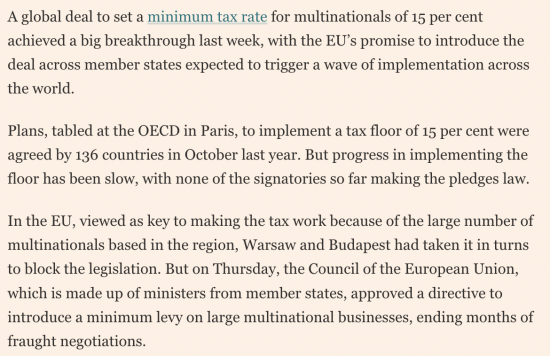As the FT noted this morning:

Most of the tax justice movement will have nothing to do with OECD and EU efforts to beat tax abuse now, claiming both are the enemies of progress on this issue.
Their objection is based on the western imperialism both, they say, embody. I too have no time for western imperialism. But unlike those who play student union politics, I am interested in real progress that can also be used to undermine post-imperial harm. I happen to think most of what the OECD and EU do fits this category well and this is an example.
Setting minimum tax rates is a step forward. I agree that it is not a big enough one, but it is progress nonetheless and is a base for further action. So, in the real world, this is a step forward for tax justice, whatever those seeking to undermine it might say.
Thanks for reading this post.
You can share this post on social media of your choice by clicking these icons:
You can subscribe to this blog's daily email here.
And if you would like to support this blog you can, here:



This is the OECD’s “pillar two”. I wonder what the practical impact of this will be. Are other counties going to copy it? The elephant in the room is as always the US. Are they going to do something similar?
And I wonder what difference it would have made if the UK had still been in the EU negotiating room. Would we have supported this or opposed it?
The specific impact of this measure will be to require large EU parented groups – ones with a turnover of over €750 million a year – to pay a ”top up” tax to bring their global overall tax rate up to 15%. A bit like the UK’s existing “controlled foreign company” rules. Good for the EU countries that get to tax the additional included income, but cold comfort to other (particularly non EU) countries where the local tax base is being eroded by interest, royalties and other fees paid out to group companies in tax havens, who will still be losing their tax revenues.
All but a handful of EU member states have a corporate income tax of 15% or more already. As I understand it, Ireland is planning to keep its 12.5% rate for companies and groups below the €750m threshold.
Excellent questions
I have no answers
But I know headline rates matter – they set moods – and 15% knocks out zero
For what it is worth, I think the UK is still planning to implement this from January 2024. https://www.gov.uk/government/publications/introduction-of-the-new-multinational-top-up-tax
But I fear that non-EU countries that struggle to enforce their existing tax rules – not least transfer pricing – may also struggle to implement a global 15% tax rate. Perhaps there would be less pressure to avoid local taxes of up to 15% if that amount would have to be paid elsewhere anyway. But could this measure in fact put downward pressure on rates that are over 15%?
The latter is a slight risk, I accept
The pressure must be to increase the rate now